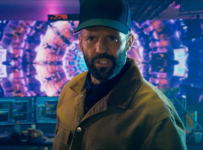“Come back. Come back to me.”
Sometimes I forget it but, at base, I love movies. I also love books, and I don’t always think that the two forms can translate effectively. I have not read Atonement, but I feel that so many parts of its filmic adaptation are the perfect synthesis of sound and image that I simply cannot imagine it being rendered into anything so mundane as words.
I don’t think that this is the greatest movie ever, nor is it absolutely perfect, but it has so many tiny moments of wonder that one cannot help but be enamoured of it.
Despite having a trailer that revealed nearly nothing of its content, Atonement has drawn me in from the very beginning of its campaign for my heart. Having just seen the US trailer, it gives rather too much away, but the one that we used over here: the music of the mysterious trailer was what captivated me. Strangely enough, the score doesn’t quite replicate that feeling in the movie itself, but rather substitutes it with many other grand things.
In 1935, Robbie (James McAvoy) and Cecelia (Keira Knightley) are lovers. They just don’t realise it yet. Cecelia’s younger sister, Briony (Saoirse Ronan), has a rather overactive imagination and, when something terrible happens, everything falls apart. Four years later, it’s World War II, and Briony is played by an unrecognisable Romola Garai. Is atonement beyond her grasp?
Atonement spends a lot of time setting itself up, to the point that it can be divided into two easily discernible halves: 1935 and 1939. Saying that this is a movie’s movie is accurate, but Atonement is largely about the power of words: the truth that lies in them and the lies that can be unleashed, however unconsciously. To this end, the motif is enforced by the beautiful soundtrack, haunted by typewriters. The first half is not without its merits, and is definitely needed in order to make the second as effective as it is, but one could be forgiven for thinking that they are languishing.
Far from it. James McAvoy puts in his standard high quality performance, and Keira Knightley always impresses when she doesn’t have to wear stupid hats and waste time with other actors slumming it in multimillion dollar action epics. The first half’s drama is actually quite laughable by the standards of 2007, especially as it hinges on a word that has lost most of its shock value for people of my age. It is quite strange to think that some modern viewers could still be scandalised. Still, context is king and it’s not hard to buy into what happens, especially when it’s just a precursor to the major issue of the evening.
If the first half of the movie is an idyllic day turning into a night gone horribly wrong, it’s harder to categorise a second half ravaged by war and split into multiple jumping time periods. It is the second half that is filled with all of the impressive stuff. The four and a half minute tracking shot on Dunkirk Beach is, of course, impressive, but it is the smaller things that stand out so well. I spent the last half hour or more of this film on the constant verge of tears, and it is due to perfection like the church scene and various hospital scenes that sell Atonement so well.
The end is not quite straightforward and may confuse some; I had to explain some plot points to some of my friends, but this only raised further questions that I couldn’t quite sort out myself. I realise I’m being vague, but so was the trailer that I saw. I think that Atonement is, in some ways, more than itself. It has a certain power, magic and intensity to it that can only be seen in the movies, and can only be felt in the moment.

